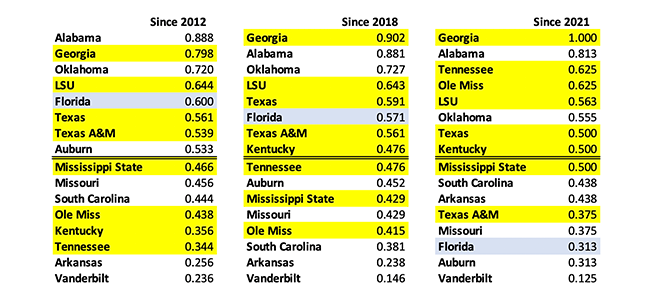
Image Credit: GatorsFB on Twitter
The 2024 SEC schedule, well, opponent release went smoothly Wednesday night. Despite the additions of Texas and Oklahoma to the conference and the dissolution of divisions, fans were generally pleased that rivalries were maintained and exciting matchups were made for what it appears will likely be a one-off schedule in 2024 as the league adjusts from welcoming two teams and evaluating the expanded College Football Playoff.
And while most opponents appeared to be divvied up rather fairly, there was one notable exception. By all current measures, the Florida Gators will face the toughest eight-game SEC schedule in 2024 and likely one of the most difficult 12-game slates in the entire nation.
But how exactly did the Gators wind up on the wrong end of the stick from SEC opponent choosers? Is it bias against Florida? A simple lack of care to create fair schedules by those picking which teams would play where?
While either would stand as an easy and palatable explanation, the truth is that the Gators were victims of a massively faulty formula employed by the SEC when determining the 2024 opponents. (Their own play of late certainly did not help.)
The SEC chose each team’s 2024 conference opponents based on three criteria:
It’s the third criteria that threw off Florida’s schedule from fair and balanced to difficult and lopsided.
Deciding a one-year slate of college football opponents based on results from an 11-year span is massively faulty given numerous factors, including coaching changes and the ebbs and flows of both recruiting and on-field success.
Florida and Tennessee are perfect examples of why this process was problematic.
The Gators have the fifth-best SEC winning percentage since 2012 (.600), yet they have the sixth-best in the last five years (.571) and actually rank an awful 14th over the last two seasons (.313). The Volunteers have the 14th-best SEC winning percentage since 2012 (.344), yet they have the ninth-best in the last five years (.476) and actually rank tied for third over the last two seasons (.625).
When the NFL calculates rotational opponents each year, it does so based on how teams placed in their respective divisions the prior season. This for a league with relatively minimal roster turnover. To repeat: The SEC created a one-year schedule based on 11 years of results in a sport that has complete roster turnover and more drastic coaching turnover (compared to the NFL).
So what exactly does this mean for Florida in 2024?
The SEC handed the Gators appropriate opponents based on its stated criteria. Florida will face teams with league winning percentages ranked second (Georgia), fourth (LSU), sixth (Texas) and seventh (Texas A&M) among the top half, plus ninth (Mississippi State), 12th (Ole Miss), 13th (Kentucky) and 14th (Tennessee) among the bottom half.
The Gators avoided playing the best (Alabama), third-best (Oklahoma) and two worst (Arkansas Vanderbilt) teams, making their schedule appear rather middle-of-the-road. But again, that’s based on records since 2012.
Looking at those same opponents over the last five seasons — and even more accurately, over the last two seasons — tells a completely different story.

Florida goes from playing 50% of the top eight and 50% of the bottom eight based on results since 2012 (as intended) to 75% of the top eight and 25% of the bottom eight based on results since 2021. Not only that, it plays three of the five most successful teams and none of the three least successful teams with its “easiest” road game coming in a decently tough environment. (The Gators’ own fall from grace does play a small role as they have not been in the top half of the league over the last two seasons, but the teams in the middle are all .500 anyway.)
To look at it from an average winning percentage standpoint, Florida was intended to play teams with an average victory rate of .518 since 2012; however, those teams are winning games at a clip of .586 since 2021. A schedule that seems fair when viewed from a prism of the last 11 years is simply unfair when recent play is put into context.
Beyond the league slate, the SEC is requiring each of its members to play one nonconference Power Five opponent in 2024. The Gators will be playing three: Florida State in their annual meeting plus Miami and UCF (joining the Big 12 this year).
The result: Florida will play 11 of 12 games against Power Five opponents with its league games including meetings with the vast majority of the top half of the SEC. This as head coach Billy Napier enters an anticipated turnaround Year 3 with the Gators possibly starting a true freshman quarterback in five-star prospect DJ Lagway.
Florida obviously has no course of action here. The opponents are set. Perhaps the way the schedule ultimately shakes out will help the Gators manage the difficulty. That remains to be seen.
In the end, any team in any sport is tasked with winning the games in front of them. Going into the season, a team cannot worry about fairness or how its schedule relates to those of its rivals. And with the expanded CFP, there will not only be more slots available to contend for a national championship but a good chance that schedule strength is given stronger consideration with teams being penalized less for the number of losses as quality of opponent is given greater weight.
Still, numbers don’t lie. Florida will have a gauntlet against which to battle through in 2024.